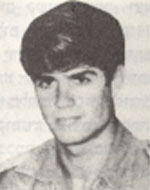Oded was born on August 2, 1951, in Ramat Gan. Until the age of twelve, he studied at the Yahalom and Nitzanim schools. During this childhood, he was very sensitive to his surroundings, loved the family and was devoted to it, strove for close friends and deepened his emotional connections with them. His sensitivity, beauty, and beauty found expression in leading roles in plays, both in kindergarten and in school. In 1963, the family moved to the United States in the Ministry of Defense, and Oded was admitted to the Manhattan School, a religious school. His approach to religion influenced him deeply, and he tried – as in everything else he decided to devote himself to do whatever was required of him and he continued to observe tradition several years later, even though he grew up in a secular home. The Bar Mitzvah celebration in the Orthodox synagogue was a special event. Oded aroused great admiration among the American leadership in the synagogue, reading the haftarah and serving as cantor for part of the prayer, as he passed before the ark. He exclaimed, in an evening voice, and in the typical Hebrew of “Sabra,” which was first heard in this synagogue.
In 1967, at the end of the sixth grade, after the Six-Day War, he returned alone to Israel, before the family returned. New York was a disgrace to him. When he enlisted in the IDF, he volunteered for the Sayeret Shaked (in fact, he wanted to volunteer for a naval commando but was not accepted because of his vision.) During his military service, they completed the “Warrior Training” which broke his leg in an accident. Despite that, he completed an infantry officer course and completed his service as a lieutenant. After completing his military service, he was accepted to the Technion. In this institution he found great interest in studies and excelled in them, without detracting or abandoning any other activity, such as sports and music. On September 27, 1973, Oded left to reserve duty for the first time since his release, a year earlier; He wanted to fulfill his duty during the break, so as not to harm his regular studies at the Technion. The parents knew that he used to take on very difficult roles; He went into raids, pursued terrorists, and returned safely. So on the morning of September 23, they did not worry much when he parted from them. They were not afraid and did not know at the time that this was their last parting. When he arrived at the reserve unit, he insisted that he be included in his original unit – the reconnaissance unit – which he loved and was connected to. At the outbreak of the Yom Kippur War, on October 6, 1973, his unit was ordered to “liquidate” an Egyptian commando unit that landed in Sinai. Oded headed the unit, which successfully fought several battles in the first three days, against the Egyptian commando. On Tuesday, October 9, the order was issued: “Budapest” stronghold under siege of an Egyptian commando and an access road should be opened to it. The difficulty was that only one axis led to a stronghold and an ambush of a large Egyptian commando force equipped with sophisticated anti-tank missiles was stationed. The commandos knew that the first attempt of tanks to break into Ma’oz failed. It was decided to liquidate the ambush as it approached – on foot. A short briefing from the company commander: “We will attack on both sides, we will burst out in the front and I want a quick liquidation.” On the right is the sea, on the left, an endless swamp, half a kilometer from the outpost, shells start to explode, The enemy lies in deep trenches and snaps, the wounded are kneaded under crossfire, the sea and the swamp from each other do not allow any other attack than the front. His former apprentices are in danger, and in front of the heavy fire he bursts forward and when he got up to jump over a barbed wire fence, he got shot Two more officers were killed that were his friends on that mision after the death of Oded the order was given to stop the advance, and the force turned in the darkness, dragging its dead and wounded, and in the morning it became clear that during the night the Egyptians had abandoned their dug positions The battle, and the siege of the “Budapest” outpost, was lifted, and on the 23rd of Tishrei, 5734, he was twenty-two years old, a special figure, a symbol of the joys of life.
